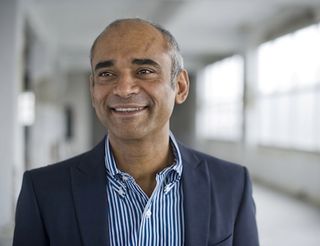Kanojia Calls Broadcasters’ 'Rube Goldberg' Knock On Aereo 'Insane'

Aereo founder and CEO Chet Kanojia brought his pitch for Aereo as an innovative remote antenna/DVR combo to C-SPAN's The Communicators as he prepared for his company's defense of its service in the Supreme Court April 22. Not only did he take aim at broadcaster arguments as baseless and even "insane," but also suggested cable was a monopoly that was pricing itself out of the market.
Kanojia said that there is nothing wrong with a combination antenna and DVR, and the debate now is where that equipment is located. Kanojia's primary argument was that his was a technology company, did not retransmit anything, and was not anything like a cable company.
Kanojia called "insane" broadcasters' characterization of Aereo as a Rube Goldberg contraption set up only to circumvent the law. He defended Aereo's approach of providing remote mini-antennas in the cloud as "good, clean, progressive thinking."
He said that if one accepts that migration of video programming to the Internet is inevitable, Aereo is "the only rational architecture that exists."
Internet is happening to everybody, he said, but the reaction to that should not be slander. It should be productive business models.
Kanojia said that Congress has been encouraging the "consumption" of local broadcast TV. He says "the idea of a new way of capturing [that] signal by an individual should somehow be prohibited is absolutely incorrect policy and is a devastating blow to innovation in the next step in our industry, which is moving all these technologies away from the consumer's home into the cloud."
He said the bargain for broadcasters to get free spectrum was programming in the public interest free to the community, on which they make billions of dollars from advertising.
Broadcasting & Cable Newsletter
The smarter way to stay on top of broadcasting and cable industry. Sign up below
"The idea that somehow they are entitled to compensation from people that manufacture equipment,” he charged. “There is no basis in law. There is no basis in policy for that argument to be made with a straight face. It is pure, straight and simple 'preservation of a business model' appeal, not legality."
Asked why cable operators should have to pay for broadcast signals, but Aereo did not, he countered that cable companies don't pay a copyright fee for "in-market" transmissions. But in any event, Aereo is a technology provider--like Sony selling TV's--not a program distributor.
"There is a distinction between cable companies, who are monopolies, and equipment providers, whose job it is to build equipment that adds value to a consumers life." He said if he were a cable company trying to do what he is doing, it would be a different story. "But I'm not technologically one, I'm not one by the statutory definition. I'm not considered one by the FCC."
Asked why he shouldn't pay retrans fees, he asked why he would, any more than "any other equipment manufacturer." He said cable companies pay retrans because they are monopolies. "If you gave me a monopoly on something, maybe there is an obligation that goes with that. We are a competitive alternative for consumers who don't want cable or can't afford [it].
He took a shot at cable rates. "When you raise your rates by 7% a year on a compounded basis, you kind of end up at a point where a shrinking population can afford your product."
Contributing editor John Eggerton has been an editor and/or writer on media regulation, legislation and policy for over four decades, including covering the FCC, FTC, Congress, the major media trade associations, and the federal courts. In addition to Multichannel News and Broadcasting + Cable, his work has appeared in Radio World, TV Technology, TV Fax, This Week in Consumer Electronics, Variety and the Encyclopedia Britannica.

